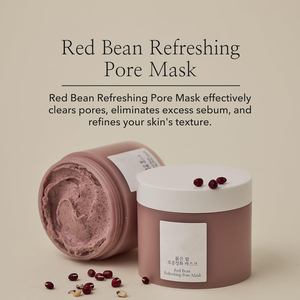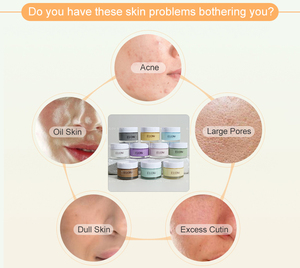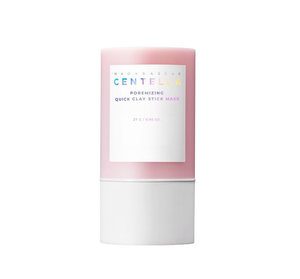(14274 products available)


















































































































































































 Ready to Ship
Ready to Ship



































There are different kinds of clay masks, and each has its unique benefits. Some of the most popular kinds of clay masks are listed below:
Choosing the correct clay facial mask requires careful consideration of various factors. Here's how to pick the right one:
Skin Type:
Identify the user's skin type accurately. Is it dry, oily, or combination? Does it have sensitive skin or acne? Choose a clay mask designed for specific skin types, ensuring it will address the unique needs and concerns of the skin effectively.
Skin Concerns:
Determine the user's primary skin concerns. Is it dealing with breakouts, dullness, enlarged pores, or fine lines? Select a clay mask targeting the specific skin concerns, like clay masks for acne or wrinkles. Look for ingredients that help with the user's particular issues, ensuring that the mask will provide the desired results.
Ingredients:
Look at the ingredients in the clay masks. Choose masks with natural and nourishing additives such as plant extracts, essential oils, or vitamins. Avoid those with harsh chemicals, artificial fragrances, or excess alcohol. Ensure that the clay used is of high quality and contains beneficial properties for the skin.
Hydration and Nourishment:
If the skin is dry or lacks moisture, choose clay masks that provide hydration and nourishment. Look for clay masks with moisturizing ingredients like glycerin, hyaluronic acid, or natural oils. These ingredients will help to restore the skin's moisture barrier, nourish it from within, and give it a healthy glow.
Sensitivity:
If the skin is sensitive, choose clay masks with gentle and soothing ingredients. Look for clay varieties known for their mildness, such as white clay or chamomile-infused clay. Avoid masks containing irritants that might cause redness, inflammation, or discomfort. Ensure that the mask will be gentle on the sensitive skin.
Application and Removal:
Consider the application and removal process of the clay mask. Choose masks that have a smooth and easy-to-apply texture. Look for instructions or recommendations that make the application process enjoyable and convenient. Ensure that the mask can be easily removed without leaving residue or causing extra effort during the skincare routine.
Fragrance:
Be mindful of the fragrance of the clay mask. Choose masks with pleasant and natural scents, like essential oils or botanical extracts. Avoid strong synthetic fragrances that may cause irritation or overpower the experience. A soothing and light fragrance can enhance the relaxation and enjoyment of using the mask.
Reviews and Recommendations:
Check reviews and seek recommendations from others who have used the clay mask. Read feedback on its effectiveness, texture, fragrance, and overall satisfaction. Reviews can provide valuable insights and guide choosing a clay mask. Consider the experiences of others to ensure the mask will be a good fit for the skin.
Applying a clay mask is a simple process. While each mask has its own instructions, here are some general steps to follow:
When used as directed, clay masks are safe for most skin types. The main concern is when people leave the mask on too long, which can dry and irritate the skin. It is best to avoid clay masks if the following applies:
It is always best to do a patch test on the inner arm before trying a new clay mask. Apply a small amount and wait 24-48 hours to check for any redness or irritation. This helps ensure safety before putting it on the entire face.
One of the primary functions of clay masks is detoxification. The clay used in the mask absorbs impurities, excess oil, and toxins from the skin's surface. This deep cleansing action helps unclog pores and prevent acne breakouts. Many clay masks also have exfoliating properties, which help remove dead skin cells and promote cell turnover. This can result in smoother, brighter skin and improved texture. Clay masks also help tighten and tone the skin. The clay works by temporarily tightening pores and giving the skin a more youthful and firmer appearance. Many clay masks are designed to hydrate and nourish the skin, especially those that include moisturizing ingredients such as honey or yogurt. These masks can help combat dryness and leave the skin feeling soft and supple.
When choosing a clay mask, there are several features to consider. Different types of clay have varying properties and benefits. For example, bentonite clay is highly absorbent and great for oily or acne-prone skin, while kaolin clay is gentler and suitable for all skin types. Many clay masks contain additional beneficial ingredients such as botanical extracts, essential oils, vitamins, and antioxidants that provide extra nourishment and target specific skin concerns. Clay masks are available in different forms, including premixed creams or gels, powdered clay that requires mixing with water, and sheet masks infused with clay. Each form has its convenience and application preferences. Most clay masks need to be applied for a certain period, usually around 10-20 minutes, before being washed off. This allows the clay to absorb impurities and provide its benefits effectively.
The design of a clay mask can vary based on its form and packaging. For powdered clay masks, the packaging often includes a resealable container or jar for easy access and storage. Cream or gel clay masks typically come in tubes or pots, making them easy to apply directly onto the skin. Some clay masks are packaged as sheet masks, which have clay-infused sheets that adhere to the face for mess-free application. Many clay masks are designed with applicators or brushes that accompany the product, allowing for smooth and even application of the mask. These applicators make it easier to spread the mask and ensure proper coverage on the skin.
Q1: What is the shelf life of clay masks?
A1: The shelf life of clay masks can range from 6 months to 2 years, depending on the ingredients and packaging. Preservatives and airtight containers help the product last longer.
Q2: What are some trends in clay mask products?
A2: Some trends include sustainable packaging, multi-purpose masks, and personalized clay mask options. Buyers want products that meet more than one skincare need.
Q3: Can clay masks be customized for private label orders?
A3: Yes. Clay masks can be customized for private label orders. Many manufacturers offer custom packaging and the option to create a unique mask that fits the brand's vision.
Q4: What are some qualities of a good clay mask?
A4: A good clay mask should have a balanced formula. It should cleanse and exfoliate without overly drying the skin. Its scent should be pleasant, and it should apply and remove easily. Also, the mask should come in appealing packaging that attracts customers.